-
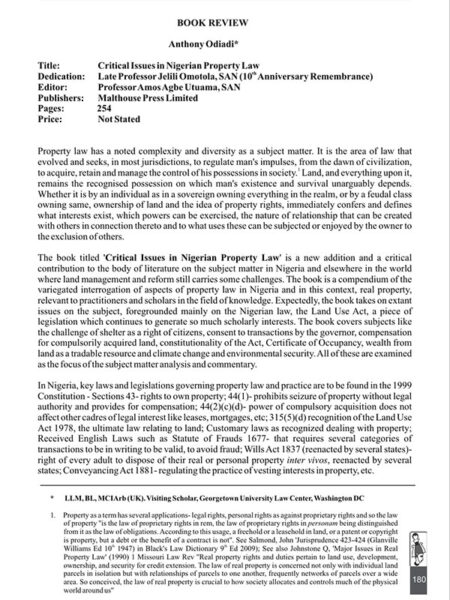
Critical Issues in Nigerian Property Law
0₦2,500.00Tony Odiadi, Visiting Scholar, Georgetown University Law Center, Washington DC, reviews the book, “Critical Issues in Nigerian Property Law” edited by Professor Amos Utuama, SAN. He gives an expansive commentary on the various topics treated by eminent authors and concludes that the book is a fitting and significant dedication to the memory of Professor Jelili Omotola, SAN in whose honour the book was put together.
-
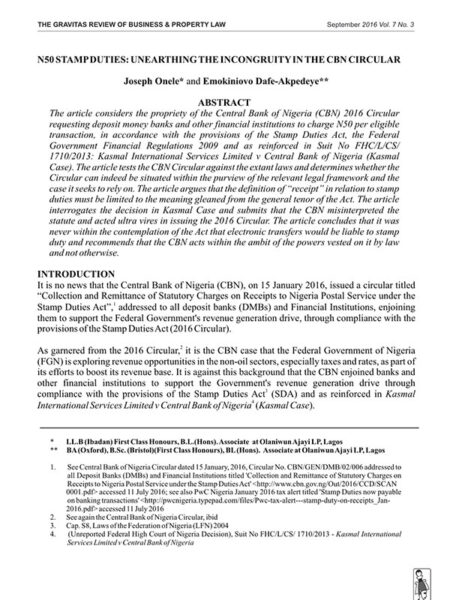
N50 Stamp Duties: Unearthing the Incongruity in the CBN Circular
0₦2,500.00Joseph Onele and Emokiniovo Dafe-Akpedeye of Olaniwun Ajayi LP, in their article “N50 Stamp Duties: Unearthing the Incongruity in the CBN Circular” examine the propriety of the Central Bank of Nigeria 2016 Circular by which Banks and other financial institutions are to charge N50 per eligible transaction. They consider the provisions of the Stamp Duties Act, the Federal Government Financial Regulations 2009 and other extant regulations, and conclude that it was never within the contemplation of the law that electronic transfers would be liable to stamp duty given that, among others, it is impracticable to issue a “receipt duly stamped”.
-
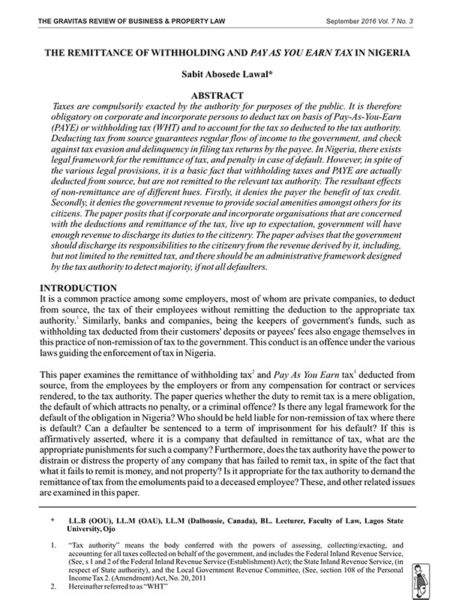
The Remittance of Withholding and Pay as You Earn Tax in Nigeria
0₦2,500.00Sabit Lawal, Lecturer, Faculty of Law, Lagos State University, Ojo, in her article “The Remittance of Withholding and Pay As You Earn Tax in Nigeria” undertakes a comprehensive review of the legal framework for remittance of WHT and PAYE tax in Nigeria. She examines issues of default and penalties for non-remittance with recommendations on how the tide of default may be stemmed.
-
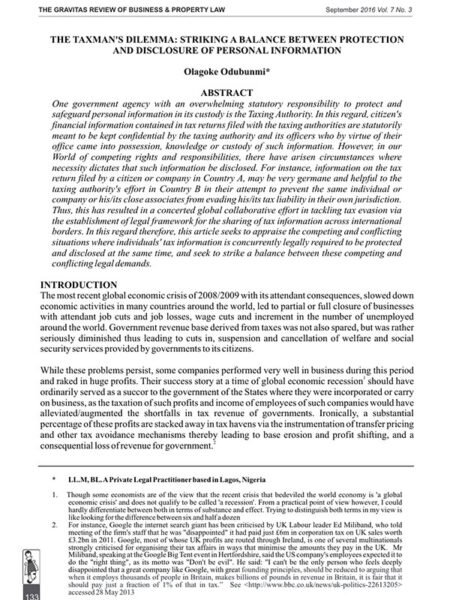
The Taxman’s Dilemma: Striking a Balance between Protection and Disclosure of Personal Information
0₦2,500.00Olagoke Odubunmi, Legal Practitioner, Lagos in “The Taxman’s Dilemma: Striking A Balance Between Protection and Disclosure of Personal Information” examines several provisions of the Companies Income Tax Act and Personal Income Tax Act on protection of personal information of a tax payer against other provisions of national legislations and international obligations mandating disclosure in an era of concerted global efforts against tax evasion, base erosion and profit shifting.
-
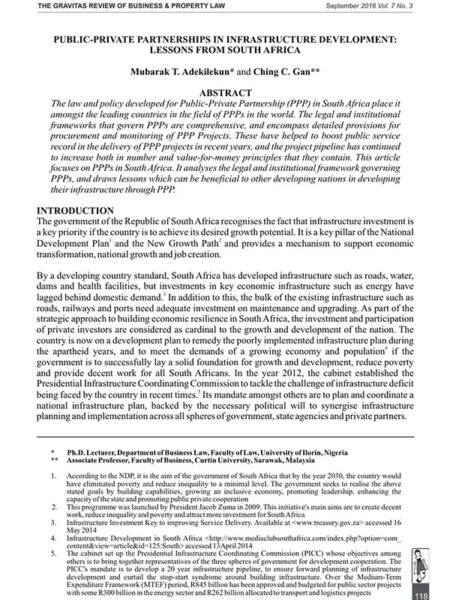
Public-Private Partnerships in Infrastructure Development: Lessons from South Africa
0₦2,500.00Dr. Mubarak Adekilekun of the Faculty of Law, University of Ilorin and Dr. Ching Gan, Associate Professor, Faculty of Business, Curtin University, Sarawak, Malaysia in their article,“Public-Private Partnerships in Infrastructure Development: Lessons from South Africa” explore the world of PPPs in South Africa analysing several legislations that have enabled a phenomenal growth of infrastructure development in the country. They contemplate several factors considered in evaluating PPP projects including Affordability, Value for Money and Risk Transfer.
-
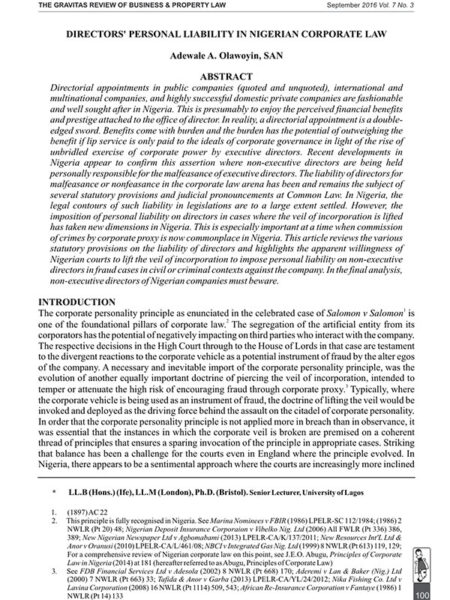
Directors’ Personal Liability in Nigerian Corporate Law
0₦2,500.00Dr. ‘Wale Olawoyin, SAN of the Faculty of Law, University of Lagos in his article “Directors’ Personal Liability in Nigerian Corporate Law” reviews various statutory provisions on liability of directors and highlights the apparent willingness of Nigerian courts to lift the veil of incorporation to impose personal liability on directors, including non-executives. He posits that while the liability of directors for malfeasance or nonfeasance in the corporate law arena has been a subject of several statutory provisions and judicial pronouncements at Common Law, the legal contours of such liability in legislations are to a large extent settled in Nigeria. The imposition of personal liability on directors in cases where the veil of incorporation is lifted has taken new dimensions especially now when commission of crimes by corporate proxy is commonplace in Nigeria.
-
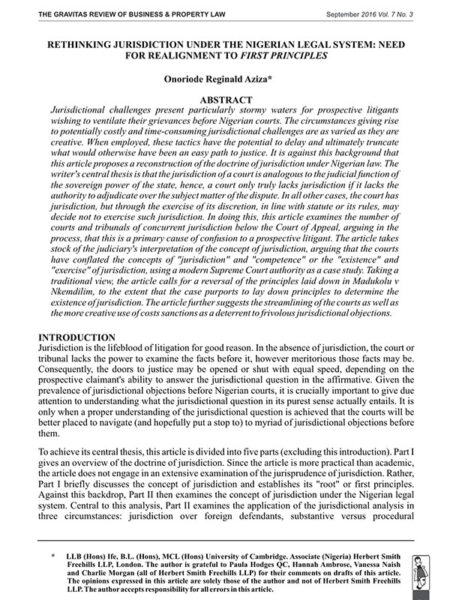
Rethinking Jurisdiction under the Nigerian Legal System: Need for Realignment to First Principles
0₦2,500.00Onoriode Aziza, Associate (Nigeria) at Herbert Smith Freehills LLP, London in “Rethinking Jurisdiction under the Nigerian Legal System: Need for Realignment to First Principles” argues that the jurisdiction of a court is analogous to the judicial function of the sovereign power of the state, hence, a court only truly lacks jurisdiction if it lacks the authority to adjudicate over the subject-matter of the dispute. In all other cases, the court has jurisdiction, but through the exercise of its discretion, in line with statute or its rules, may decide not to exercise such jurisdiction. He examines the number of courts and tribunals of concurrent jurisdiction below the Court of Appeal and takes stock of the judiciary’s interpretation of the concept of jurisdiction, arguing that the courts have conflated the concepts of “jurisdiction” and “competence” or the “existence” and “exercise” of jurisdiction, using the Supreme Court decision in Agip Nigeria Limited v Agip Petroli International and Others as a case study. He calls for a reversal of the principles laid down in Madukolu v Nkemdilim, to the extent that the case purports to lay down principles to determine the existence of jurisdiction.
-
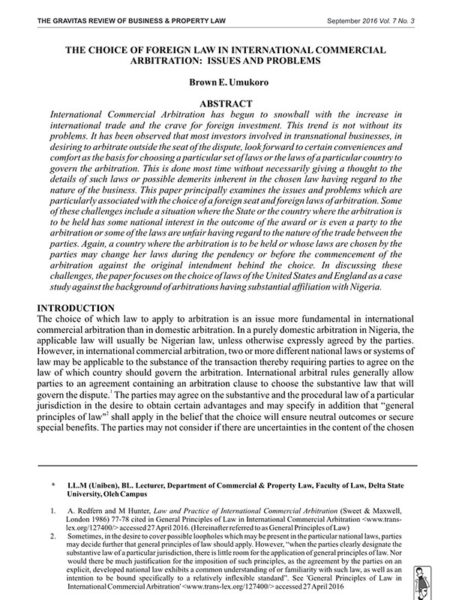
The Choice of Foreign Law in International Commercial Arbitration: Issues and Problems
0₦2,500.00Brown Umukoro, Lecturer, Faculty of Law, Delta State University, Oleh in his article “The Choice of Foreign Law in International Commercial Arbitration: Issues and Problems” examines how the expected outcome or intended benefit of a choice of foreign law in international commercial arbitration may be frustrated by several factors including law and public policy of the foreign country and change in laws during the pendency of arbitration. He concludes that the Decolonisation and Law of the Seat theories do not adequately address the concern of investors and advocates a comprehensive code of rules for the resolution of conflict between the lex arbitri and other systems of law.
-
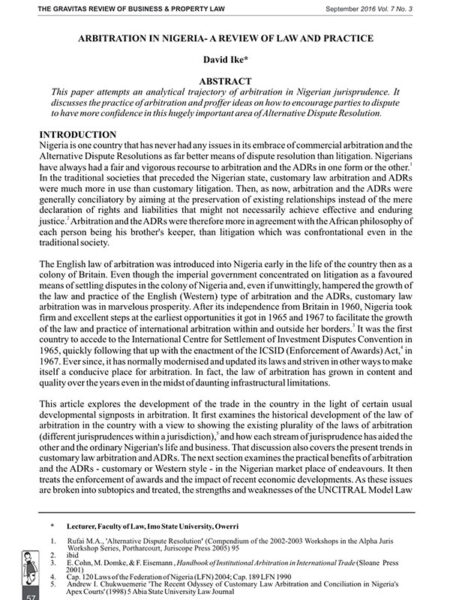
Arbitration in Nigeria – A Review of Law and Practice
0₦2,500.00David Ike, Lecturer, Faculty of Law, Imo State University, Owerri in his article “Arbitration in Nigeria-A Review of Law and Practice” gives an overview of the development of arbitration and its practice in Nigeria. He discusses current issues in arbitration including the constitutionality of section 34 of the Arbitration and Conciliation Act, pre-emptive court proceedings, recognition and enforcement of arbitral awards, and arbitrators’ fees.
-
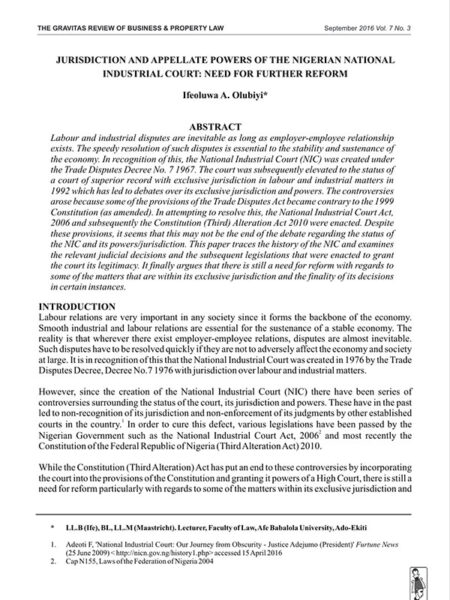
Jurisdiction and Appellate Powers of the Nigerian National Industrial Court: Need for Further Reform
0₦2,500.00Ifeoluwa Olubiyi, Lecturer, Faculty of Law, Afe Babalola University, Ado-Ekiti, in her article “Jurisdiction and Appellate Powers of the Nigerian National Industrial Court: Need For Further Reform” undertakes an historical analysis of the jurisdiction and status of the National Industrial Court as a court of record. She posits that while the Constitution of the Federal Republic of Nigeria (Third Alteration) Act 2010 may have put an end to some of the controversies surrounding the jurisdiction of the court, the finality of its decision, ‘exclusive jurisdiction’ in child labour, child abuse and human trafficking cases, and application of international treaties without domestication may be contrary to other sections of the Constitution.
-
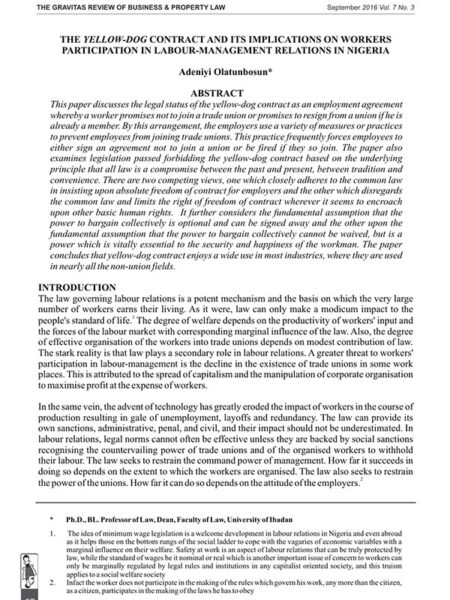
The Yellow-Dog Contract and its Implications on Workers Participation in Labour-Management Relations in Nigeria
0₦2,500.00Professor Adeniyi Olatunbosun, Dean, Faculty of Law, University of Ibadan in “The Yellow-Dog Contract and Its Implications on Workers Participation in Labour-Management Relations in Nigeria” discusses the legal status of the yellow-dog contract as an employment agreement whereby a worker promises not to join a trade union or promises to resign from a union. He examines statutory provisions prohibiting workers from joining a trade union and those forbidding the yellow-dog contract. He explores two competing views, one which adheres to the common law in insisting upon absolute freedom of contract for employers and the other which limits the right of freedom of contract wherever it seems to encroach upon other basic human rights. He concludes that the yellow-dog contract enjoys a wide use in most industries, where they are used in nearly all the non-union fields.
-
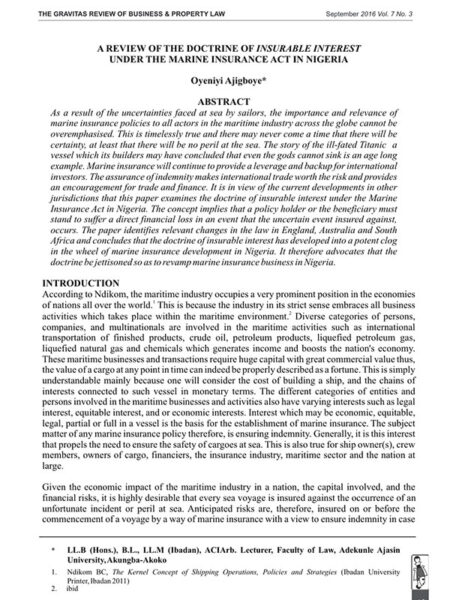
A Review of the Doctrine for Insurable Interest under the Marine Insurance Act in Nigeria
0₦2,500.00Oyeniyi Ajigboye, Lecturer, Faculty of Law, Adekunle Ajasin University, Akungba-Akoko, in his article “A Review of the Doctrine of Insurable Interest under the Marine Insurance Act in Nigeria” gives an overview of the doctrine of insurable interest in marine insurance. The concept implies that a policy holder or the beneficiary must stand to suffer a direct financial loss in an event that the uncertain event insured against, occurs. He identifies relevant changes in the law in England, Australia and South Africa and concludes that the doctrine of insurable interest has developed into a potent clog in the wheel of marine insurance. He advocates that the doctrine be jettisoned so as to revamp marine insurance business in Nigeria.
The Gravitas Review of Business & Property Law



